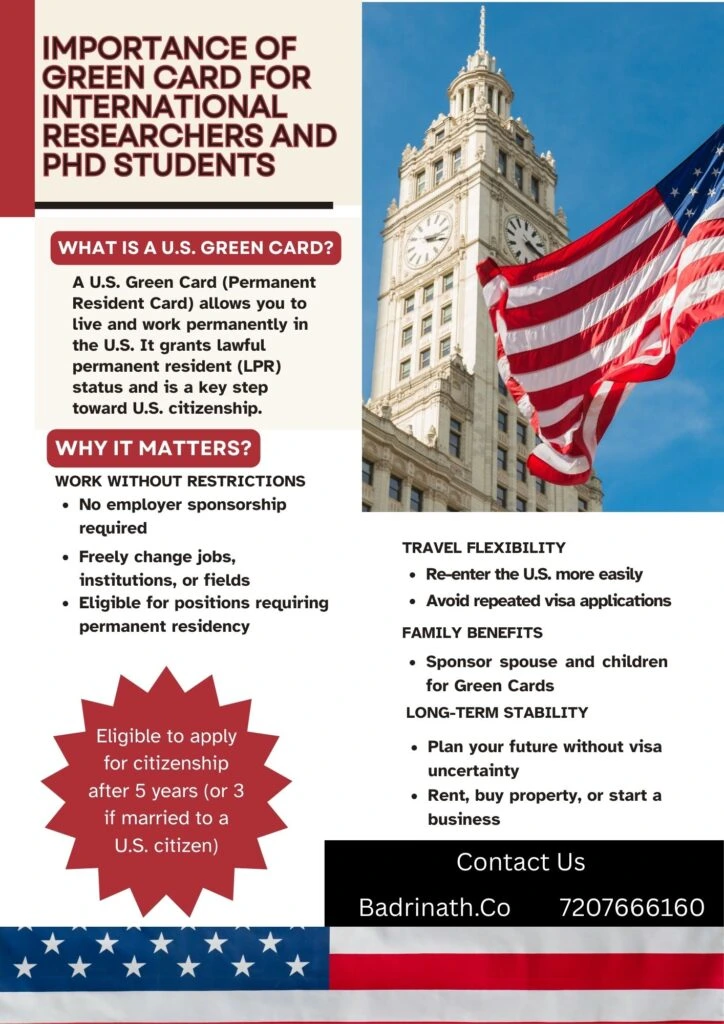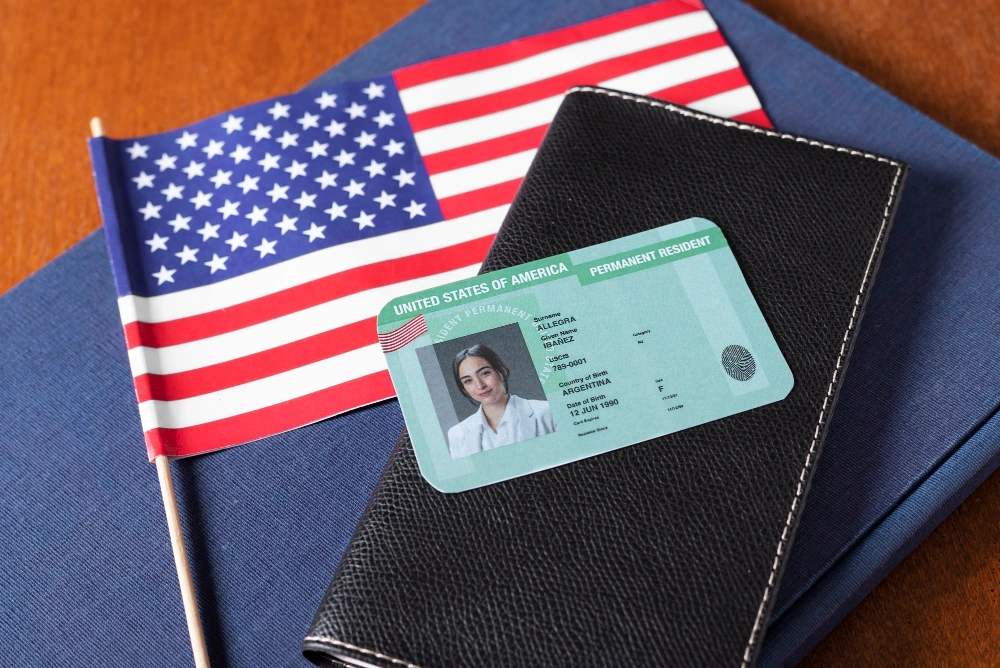Legal residency is only one aspect of a US Green Card. In general, it serves as a springboard to long-term opportunity, independence, and stability in the US. This article will essentially explain what a green card is. How it specifically relates to academic professionals and why international academics with PhDs who want to establish their careers in the United States find it especially helpful.
A U.S. Green Card: What Is It?
Foreign nationals can live and work in the US permanently with a US Green Card, also known as a Permanent Resident Card. Green card bearers are able to:
- Work for any American employer.
- Less limitations while traveling abroad
- Obtain federal benefits (subject to restrictions)
- Then, after fulfilling residency requirements, petition for U.S. citizenship.
A US green card can be obtained through a number of channels, such as employment-based petitions, family sponsorship, asylum or refugee status, and special immigrant categories. However, the employment-based green card, especially the EB-2 category, is the most pertinent for highly educated professionals such as researchers and PhD students.

Which category does the EB-2 US Green Card fall under?
The Employment-Based Second Preference (EB-2) category is intended for people who have a master’s or doctoral degree or who are exceptionally skilled in their industry.
Under the EB-2 category, there are two main pathways:
- EB-2 with a PERM labor certification and a work offer. However, the latter requires both a company sponsor and evidence that no suitable U.S. workers are available for the position.
- The job offer and labor certification requirements are waived under the EB-2 National Interest Waiver (NIW). if the candidate can show that their activity serves the interests of the US as a whole.
What is a National Interest Waiver, or NIW?
For researchers and PhD students, the National Interest Waiver (NIW) is a well-liked and calculated green card option. permits self-petitioning, which means that if you fulfill certain requirements, you can do so without a job offer or employer sponsorship.
To be eligible for an NIW, candidates need to demonstrate:
- Their work is extremely important and helpful to the nation.
- They are in a good position to progress in their field.
- Therefore, removing the criteria for a job offer would be advantageous for the United States.
A PhD student studying AI technology, cancer treatment, or climate change, for instance, may be eligible for an NIW if their work has the potential to benefit the nation.
What Makes a US Green Card Crucial for Foreign Researchers?
International PhD students and researchers must have a US green card for the following reasons:
1.The ability to work without restrictions on visas
The majority of foreign academics first enter the country on employment (J-1 or H-1B) or student (F-1) visas. Strict restrictions, such as employer sponsorship and expiration periods, apply to these visas. In a similar vein, a green card removes these problems and offers job flexibility.
2. Using a US Green Card for Stability and Long-Term Career Planning
PhD holders who are granted permanent resident status are able to apply for tenure-track academic positions, plan long-term research projects, and apply for grants or federal funds that are frequently only available to U.S. residents.
3. Federal Research Grant Eligibility
The NIH and NSF, among other federal research agencies in the United States, mandate that grantees be citizens or permanent residents of the country. Obtaining a green card provides access to financial possibilities that are essential for research career progression.
4. The Road to Citizenship
One can apply for U.S. citizenship after five years of having a green card. Other advantages include the ability to vote and immunity from deportation.

Why is it so important for PhD students to have a U.S. green card?
1. The F-1 to Permanent Residency Transition
After receiving an F-1 visa, many PhD candidates seek for Optional Practical Training (OPT). These are only short-term fixes, though. Additionally, a green card offers a long-term immigration alternative that allows one to remain in the United States after academic programs conclude.
2. Opportunities for Self-Petition Through EB-2 NIW
The EB-2 NIW gives PhD students autonomy over their immigration future by enabling them to self-petition, in contrast to typical visa procedures. For postdoctoral researchers, who might not yet have a permanent job, this is particularly crucial.
3. More Employment Possibilities with a US Green Card
Nonetheless, PhD holders with green cards are free to work in government, business, academia, or entrepreneurship without worrying about visa restrictions. They are typically not affiliated with any one organization or employer.
Concluding remarks
International PhD students can further their careers with a U.S. green card, which is more than simply a legal document. Gaining permanent residency offers the independence, security, and opportunity that are necessary for long-term success in the United States, whether via employer sponsorship or the EB-2 NIW path.
Important Takeaways:
- In actuality, a U.S. green card enables both permanent residency and the freedom to work.
- Therefore, for researchers and PhD students, the EB-2 NIW route is the best option
- Pathways to citizenship, stability, and money are made available by permanent residency.
Keywords:
Green card,
US green card,
PhD green card,
NIW,
EB-2,
National interest waiver,
Immigration for researchers,
Green card for PhD students,
Permanent residency USA.
Read more about the topic
External Links
Green Card Options for PhD Holders
What International PhDs Need To Know About Getting A Green Card – Answers To 5 Common Questions
Internal Links
Transitioning from F-1/OPT or J-1 to a Green Card
Boosting Citations and Scholarly Visibility for a Stronger Green Card Case







